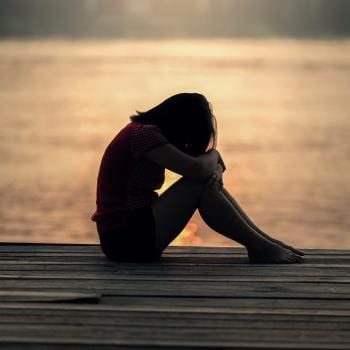Melanie Martinez’s music video “Dollhouse” is really getting to me. I’ve watched it multiple times since writing about Cynthia Jeub, and have been struck by how much it speaks to me. Why, you ask? Let me explain. First, the video:
Before I get into my story some more, I want to quote from a recent blog post by homeschool graduate Lana. Lana’s writing has long spoken to me, and is a story only too common in the Christian homeschooling communities we grew up in.
Our family was the center of all the homeschool activities. People came to our house every day, to buy cows milk, to pick up the homeschool news letter, to visit. I felt like I was always on the spot light, even though an hour before mom was yelling at me and telling me how bad I was. It was insanely hypocritical.
. . .
We suffered in silence while our families put on fronts in our community.
It was all fake shit.
Growing up, my parents placed a lot of emphasis on image. Like Lana, my family was at the center of homeschool activities. People were stopping by all the time, and new homeschoolers were constantly being referred to my mother for advice and mentorship. I cannot emphasize just how highly everyone in our homeschool community and church community spoke of my mother. My family was seen as perfect. We were put on a pedestal—and my parents worked hard to ensure that we stayed there. Signs of weakness were not allowed.
Every time we went out my parents told us children to be on our best behavior, because we were representing Jesus, we were representing homeschoolers, and we were representing large families. We knew better than to misbehave. And then there was this one time my family was featured in the local newspaper. When we children spoke to the reporter, my dad told us beforehand that it was our job to “wow” her. A few months ago, I tracked down the article she wrote, and there it was, all glowing and positive. But I knew the things between the lines.
There were things no one outside of our family saw.
There were my parents’ marital problems, and my dad’s depression. When people came by, all of this was dropped and smiles were quickly plastered on. No one saw my parents fighting in front of us children. No one watched as my mom packed and threatened to leave. No one saw my dad retreat to his room upon returning home from work, day after day after day. I learned to tip toe around the house because I had to. We all did. But outside of our family? Everyone thought my parents had this wonderful, strong marriage. No one saw my father’s pain, because he hid it. My parents stopped having children because of my dad’s depression. He said he just couldn’t take anymore. No one knew that.
Somehow, both of my parents ended up taking me as their confidant when I was in high school. My father and I had a very close bond, and did everything together. My mother would ask me for advise on what dad meant when he said this, or did that, because I understood him better and was better able to interpret his moods. At one point my mother told me she would be jealous of my relationship with my father if she didn’t have “the power of the bed.”
I wish my parents’ need to put on a perfect face hadn’t prevented them from getting the help they needed. My parents never got marriage counseling. I think it would have helped them. I shouldn’t have had to be their go-between. My father never did anything about his depression. I wish he had. It makes me sad that they had to pretend everything was okay when it wasn’t. There were lots of truly wonderful things about my parents, and I have so many positive childhood memories. I just wish we had been allowed to be real rather than having to be perfect.
A lot of the biggest problems began when my younger sister Heidi and I left for college and began making our own decisions. My parents couldn’t just let us go, and in their efforts to hold on and maintain control, they caused both of us a lot of pain. What my parents put me through was so horrific that even years later my mother was able to throw me for a tailspin with a simple phone call. It was so bad that even today my sister’s husband has trouble talking about those times—what they did to him, too, was etched on his psyche. But nobody outside of our family saw any of this.
To those in my parents’ homeschool and church community, we were still picture perfect. My parents carefully controlled the message and mitigated the fallout.
No one saw our pain.
During her freshman year of college, my sister Heidi began dating a young man from a similar background—but without asking my dad’s permission. My father wrote a long letter and mailed it to her. Heidi came to me with the letter, baffled and worried. In that letter my father expressed suicidal thoughts—and used those thoughts to guilt her. How could she do this to him, he asked? My poor sister. No one should have to carry that burden. No one saw that letter but us.
The summer after her freshman year of college, I found my sister Heidi sobbing in her room. She had gotten a small tattoo to celebrate the end of her first year, and in response my mom had written her a scathing seven-page letter. And there my sister was, curled into a ball, sobbing. No one else saw that.
In public, our family looked perfect. In private, we had problems. In private, it hurt.
When I ceased to be a young earth creationist, my father’s first comment was to ask what he was supposed to do about the other children. In other words, I had become a contaminant. How was he to prevent me from contaminating my siblings? In that moment, I realized I was expendable—that my father would consider cutting me off for the good of my younger siblings. Nobody else was there for that conversation. Nobody else saw what I did.
There’s so much more. My parents ordered me to break up with my boyfriend the summer I was twenty. When I refused, they considered cutting me off from the family. My father lost it and yelled at me one New Year’s Eve, going on for five solid minutes and scaring my younger siblings. Nobody saw these things.
Outside, my family was picture perfect. Inside, we were hurting.














